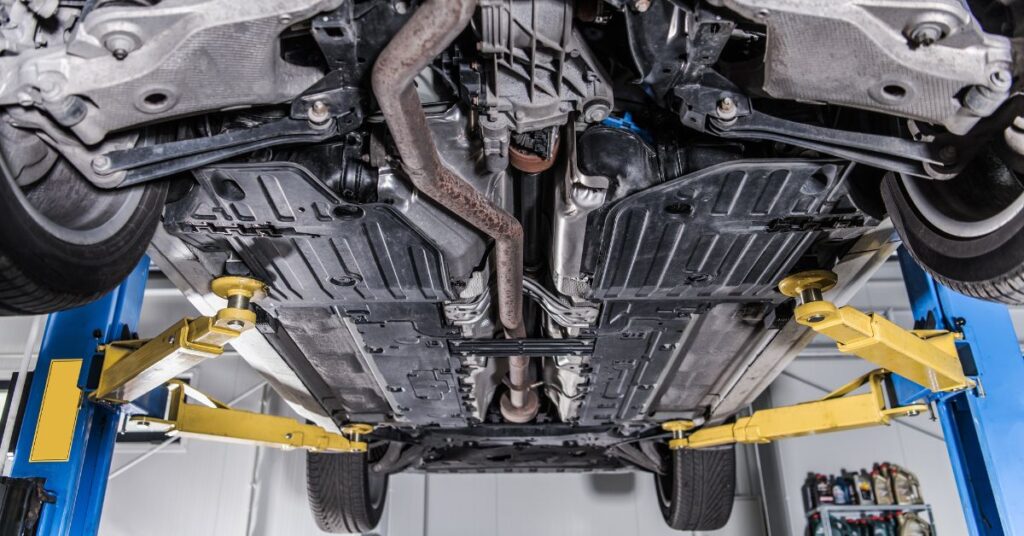Table of Contents

The health of your vehicle’s suspension system is imperative for a secure and comfortable drive. The suspension system serves as the backbone of your vehicle, absorbing bumps and helping in efficient navigation and control. It’s important to understand the signs that you need suspension repair. Having your suspension repaired or serviced on a timely basis can help prevent more extensive issues down the road.
Role of A Suspension System
A vehicle’s suspension system performs crucial functions that are imperative for a safe and comfortable driving experience:
Ensuring Safety
Safety is paramount when driving. The suspension system is pivotal for maintaining the vehicle’s stability. It aids in effective braking and prevents the car from rolling over, skidding, or losing control, especially during turns. A well-maintained suspension system ensures that the vehicle responds promptly to the driver’s inputs and handles well.
Enhancing Comfort
A smooth ride is synonymous with a good suspension system. The system absorbs the shocks from uneven road surfaces, providing passengers with a comfortable ride. Without a properly functioning suspension system, every bump and dip in the road will be felt, resulting in an unpleasant driving experience.
Improving Vehicle Control
The suspension system is integral to a driver’s ability to control the vehicle. It ensures the car handles corners well and responds accurately to steering input. Good suspension contributes to short braking distances, quick acceleration, and efficient vehicle handling during different driving conditions. Having your suspension repaired as needed can equip your vehicle with these benefits.
Signs You Need Suspension Repair
Understanding the various signs of suspension issues is paramount for timely diagnosis and repair. Here’s a deeper insight into each sign that you need suspension repair:
1 – Car Rides Roughly
When a vehicle begins to ride roughly, it often signifies an issue with its suspension system. A well-functioning suspension should provide a comfortable and relatively bump-free ride. However, if you start feeling every pothole and every bump on the road, it indicates worn or damaged shocks or struts. This not only makes your drive uncomfortable but also dangerous.
2 – Pulling or Drifting When You Turn
If your vehicle starts pulling to one side or drifting unpredictably when you are making turns, it could be a symptom of failing suspension components. When the suspension system is compromised, the vehicle won’t be able to maintain its lateral stability. This increases the risk of a rollover. This pulling or drifting sensation often shows that the shocks do not keep the vehicle body stable against the centrifugal force during a turn.
3 – Damaged or Oily Shocks
A visual inspection of your shocks can reveal notable signs of wear and damage. If the shocks look physically damaged or have oily residue around them, it’s typically a sign that they’re leaking fluid. Leaking shock absorbers may not function properly, as they won’t be able to absorb bumps and vibrations effectively. This leaking is usually due to worn seals, and the loss of hydraulic fluid diminishes the shock’s ability to dampen vibrations. This is an immediate sign that you need suspension repair.
4 – Uneven Tire Treads
Uneven tire wear is a subtle but clear indicator of suspension problems. The suspension system should hold the vehicle evenly, ensuring balanced tire wear. However, when worn out or damaged, suspension components like springs may not support the vehicle properly. This can lead to an uneven distribution of weight and, consequently, uneven tire wear. Regularly inspect your tires for uneven wear patterns, as it not only signifies suspension issues but requires you to replace them sooner than expected.
5 – Dips or Nose Dives When You Stop
One of the alarming signs of suspension issues is when your vehicle’s front end (the nose) dips or dives downward excessively when braking. This phenomenon, often called “nose diving,” suggests that the shocks and struts are worn out and unable to stabilize the vehicle’s weight transfer during braking. This affects the vehicle’s appearance and extends the braking distance, which can be dangerous in emergency-stopping situations.
Each symptom above reflects different wear and tear aspects in the suspension system. Acknowledging these signs and seeking professional assistance from McCullough NAPA Auto Care for further diagnosis and suspension repair is crucial for maintaining a safe and smooth driving experience. Regular inspections and prompt responses to these signs are key to preventing further damage and ensuring your vehicle’s longevity and performance.
Repair Your Suspension System With McCullough NAPA Auto Care
Maintaining a healthy suspension system is vital for the safety and comfort of your driving experience. Being aware of the signs of a failing suspension system and acting promptly can save you from costly repairs and potential accidents in the future. Contact us today if you suspect your suspension system needs repair.
FAQ About Suspension System Repair
Ideally, your suspension system should be inspected at least once a year. If you start noticing any signs of wear or damage, it’s advisable to have it checked immediately.
The lifespan of a suspension system varies, but typically they should be checked and possibly replaced after 50,000 to 100,000 miles.
es, there are various types, including dependent, independent, air, and hydropneumatic suspensions, each serving different functions and purposes.
Driving with a faulty suspension system is dangerous as it impacts your vehicle’s stability and control. If you suspect any damage, seek professional help immediately.
Several factors can affect the suspension system, including driving habits, road conditions, and the vehicle’s overall age and maintenance history.

